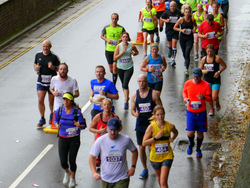Introduction
In this article, I shall explain something about what to expect when you seek acupuncture treatment for depression. In a survey of 9000 UK acupuncture patients, 11% were presenting with psychological complaints; in many practices, depression represents a significant portion of this category. Additionally, the World Health Organization in 2021 (1), cited a figure of 280 million people suffering from depression internationally. It is a common problem, and two-thirds of adults will at some time experience depression severe enough to interfere with normal activities.
What to Expect When You Come
Should you decide to come for acupuncture, I shall be interested in whether you have a history of depression previously, when and how it began (eg. identifiable events or disproportionate reactions thereto), and how it affects your daily life (eg. ability to work, family and social relationships etc). Your wider health is enormously important too. Do you feel the depression is a reaction to the burden of chronic pain or to limitations imposed by some other medical problem? Might it even stem from medication used to control that problem? Did it arise out of chronic stress, from say work, a difficult relationship or caring for relatives?
Have you had depression in the past which now seems to have recurred in response to a new health problem, a recent life event, or stressful circumstances? Is there any link with hormonal changes such as being premenstrual or perimenopausal? Oestrogen levels fall at these times, in turn reducing serotonin levels.
Is there any seasonal component involved? If seasonal affective disorder (SAD) is at work, we should be cautious about medicalising a natural instinct to hibernate. If our culture permitted us to slow down a little in winter, SAD might be diagnosed less frequently. Take a look at my Seasonal Tips for Winter.
Looking more widely still, I am interested in the full array of other symptoms which accompany your depression. These can encompass fatigue, poor concentration, sleep disturbance, appetite or weight changes, or feelings such as irritability, anger, anxiety, panic or guilt. I can then begin to re-frame the picture of your health from a Chinese medical perspective, and devise a plan of treatment. If it is practical, we can try to directly help obvious causes of your depression, such as stress or chronic pain. In other cases, the causes do not lend themselves to such an approach, in which case we just try to tackle the depression.
Lifestyle Advice
Lifestyle advice is often a particularly useful part of treatment. In Chinese medicine, the health of our physical body is considered important for our mental and spiritual health too. This gives our shen or spirit, a good home in which it can settle. We may need to discuss your diet, any possible nutrient deficiencies, sleep, exercise, social life, alcohol intake, and drugs both prescribed and recreational. Diet and nutrient considerations may include omega-3 oils, B vitamins, magnesium, zinc, gut health/biome and blood glucose control.
Rest assured, acupuncture can safely and effectively be used alongside other interventions like counselling or anti-depressant medication.
Please do contact me if you would like to discuss anything further. Below you will find the results of recent research, some into acupuncture for depression, and some which suggests worthwhile self-help measures. The research varies in quality, but systematic reviews and randomised controlled trials are generally considered to provide the highest quality evidence. If you would like to read more about evidence quality, I would refer you to the British Acupuncture Council’s description of the evidence pyramid.
Scientists at the University of Bern for example, published a paper(2) confirming the benefits of exercise for patients with depression.
Men and women seem to be affected by differing external factors too: research (3) suggests men are more affected by work, financial stress and living in a deprived area, whereas for women, relationship issues are more of a risk factor.
We also nowadays consider whether inflammation might lie to some extent and in some cases, behind depression: scroll down below to my 2018 article on the beneficial effects of the Mediterranean diet.
(1) World Health Organization Fact Sheet, 13 September 2021.
(2) Effects of Exercise on Anxiety and Depression Disorders: Review of Meta-Analyses and Neurobiological Mechanisms. CNS & Neurological Disorders-Drug Targets, 2014.
(3) Men’s depression is fuelled by different stressors to women, study finds. World Economic Forum, 17 December 2019.

 A systematic review by university research teams in Australia and China, suggests acupuncture alone or combined with standard care, is associated with significant improvements in perimenopausal depression. A total of 25 randomised controlled trials, involving 2213 women, were examined. The benefits of acupuncture were maintained at 2, 4 and 12 week follow-ups.
A systematic review by university research teams in Australia and China, suggests acupuncture alone or combined with standard care, is associated with significant improvements in perimenopausal depression. A total of 25 randomised controlled trials, involving 2213 women, were examined. The benefits of acupuncture were maintained at 2, 4 and 12 week follow-ups. Acupuncture combined with antidepressants, is more effective for improving depression than antidepressants alone, reports an international team from the US and China. Sixty patients aged 18 to 70 with moderate depression were randomly assigned to receive either acupuncture (including some electroacupuncture) plus antidepressants, or just antidepressants alone. Acupuncture was given three times a week for eight weeks, with follow up for four further weeks.
Acupuncture combined with antidepressants, is more effective for improving depression than antidepressants alone, reports an international team from the US and China. Sixty patients aged 18 to 70 with moderate depression were randomly assigned to receive either acupuncture (including some electroacupuncture) plus antidepressants, or just antidepressants alone. Acupuncture was given three times a week for eight weeks, with follow up for four further weeks.  Exercise benefits depression and can prevent its development, according to a major review by the Federal University of Santa Maria in Brazil and King’s College London. Highlights of the study include:
Exercise benefits depression and can prevent its development, according to a major review by the Federal University of Santa Maria in Brazil and King’s College London. Highlights of the study include: A systematic review undertaken by researchers at University College, London, suggests an association between adherence to the Mediterranean diet and lower rates of depression. A total of 41 studies were included in the review. An array of dietary approaches were covered by the studies, but the most compelling link was that between the Mediterranean diet and depression. An anti-inflammatory diet was also associated with lower rates of depression.
A systematic review undertaken by researchers at University College, London, suggests an association between adherence to the Mediterranean diet and lower rates of depression. A total of 41 studies were included in the review. An array of dietary approaches were covered by the studies, but the most compelling link was that between the Mediterranean diet and depression. An anti-inflammatory diet was also associated with lower rates of depression.